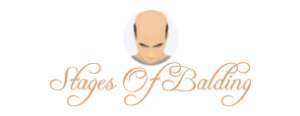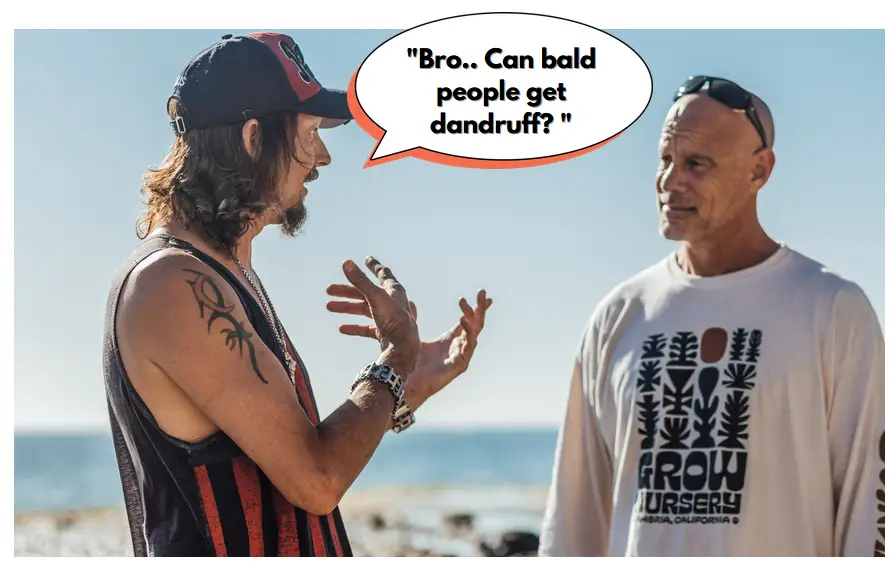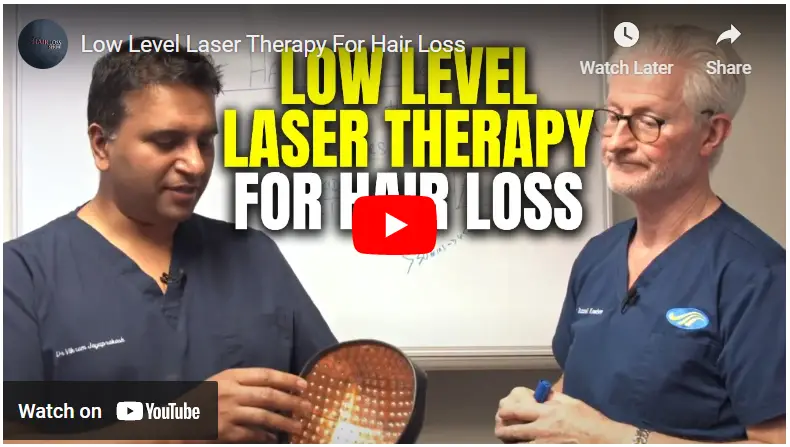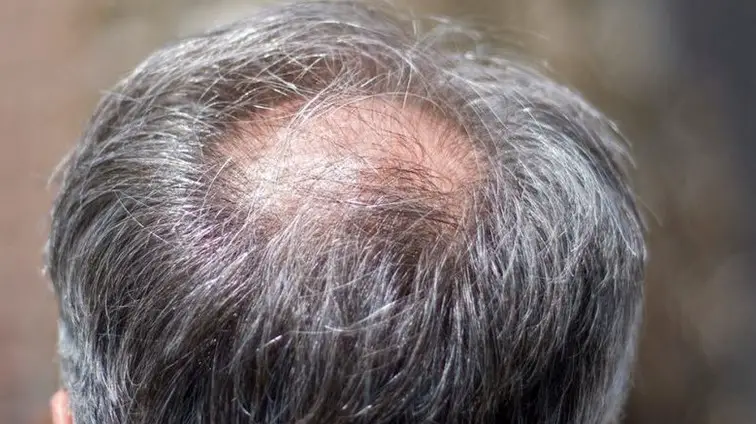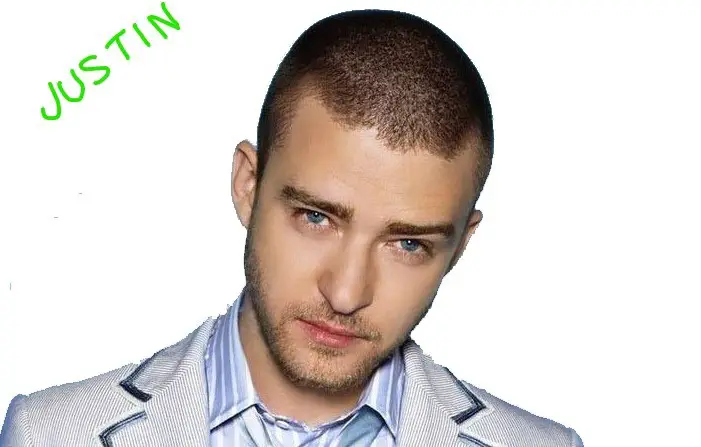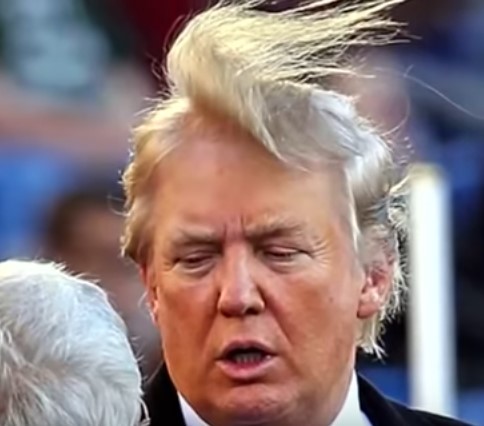Unraveling the truth about scalp health: Can bald people get dandruff? Discover the causes, myths, and realities of dandruff in bald individuals and learn how to maintain a healthy scalp.
Dandruff, a common scalp condition, has been a topic of discussion and concern for many, irrespective of their hair length or density. Characterized by white, flaky skin shedding from the scalp, dandruff can be a source of discomfort and embarrassment for many. While it’s a prevalent notion that dandruff is exclusive to those with a full head of hair, the reality paints a different picture.
Can Bald People Get Dandruff?
Yes, bald people can get dandruff. Dandruff arises from the shedding of skin from the head, triggered by various factors. These can range from irritation due to shampoos or other skincare products, or even a combination of them. Another significant contributor to dandruff is dryness, an issue often faced by bald individuals. Surprisingly, some experts suggest that bald individuals might be at a higher risk of developing dandruff compared to their haired counterparts.
Furthermore, certain skin conditions, such as eczema or psoriasis, can also be culprits behind dandruff formation. A common misconception is that dandruff only manifests in areas with abundant hair. However, this is far from the truth. Bald individuals, despite lacking hair, still possess a scalp, making them susceptible to dandruff. In essence, baldness does not act as a shield against dandruff, nor does adopting baldness serve as a remedy to the condition.
Understanding the intricacies of scalp health becomes paramount, especially for bald individuals. Recognizing the causes, symptoms, and treatments can not only alleviate the condition but also boost one’s confidence and comfort. As we delve deeper into this topic, we aim to shed light on the myths, realities, and preventive measures associated with dandruff in bald individuals.
The Science Behind Dandruff
Dandruff, a term we often hear, yet many of us might not fully comprehend its intricacies. Let’s delve deep into the science behind this common scalp condition, exploring its causes and its relationship with baldness.
What is Dandruff?
Dandruff refers to the white, flaky skin that sheds from the scalp. These flakes, often accompanied by itchiness, can be a source of discomfort and self-consciousness for many.
Definition and Characteristics:
-
- Dandruff is a mild form of seborrheic dermatitis.
- It’s characterized by white or yellowish scales that shed from the scalp.
- Often accompanied by redness and itchiness.
Difference between Dry Scalp and Dandruff:
Dry Scalp:
-
-
- Causes small, white flakes.
- Often results from environmental factors like cold air or harsh hair products.
-
Dandruff:
-
-
- Causes larger, oily flakes.
- Often a result of an overproduction of oil on the scalp or a reaction to yeast present on the skin.
-
Causes of Dandruff
Understanding the root causes of dandruff can help in its effective treatment and prevention.
Sebum Production:
-
- The scalp produces a natural oil called sebum.
- Overproduction can lead to an oily scalp, creating a breeding ground for dandruff-causing agents.
- Learn more about the role of sebum in hair health.
Malassezia Fungus:
-
- A yeast-like fungus that lives on the scalps of most adults.
- In some people, it irritates the scalp, leading to more skin cells growing.
- When these cells die and fall off, they appear as dandruff.
External Factors:
-
- Environmental factors like cold, dry air.
- Harsh hair care products or infrequent shampooing.
- Stress and diet can also play roles in dandruff development.
Dandruff and Baldness: The Connection
One might wonder, without the lush locks, how can a bald scalp produce dandruff? The answer lies in understanding the scalp’s nature, irrespective of hair presence.
- Bald scalps, like any other, produce sebum, which can lead to dandruff if not managed properly.
- The absence of hair doesn’t negate the presence of skin cells, which can shed and appear as dandruff.
- In fact, some experts suggest that bald individuals might be more prone to dandruff due to increased exposure of the scalp to external factors.
Discover if dandruff can cause balding and how to manage it effectively.
Debunking Myths and Misconceptions
In the vast realm of hair and scalp care, numerous myths and misconceptions have taken root. These often lead to confusion and misguided practices. Let’s address some of the most common myths surrounding dandruff, especially in relation to baldness, and shed light on the reality.
Common Myths
Only People with Hair Get Dandruff:
-
- A widespread belief is that dandruff is exclusive to those with a mane. The flakes, after all, are often seen amidst strands of hair. But is this really the case?
Shaving Head Will Eliminate Dandruff:
- Many think that taking the drastic step of shaving one’s head can be the ultimate solution to dandruff woes. The logic being, no hair equals no dandruff. But is this a foolproof solution or just another myth?
Dive deeper into hair loss-related myths and their origins here.
The Reality
Scientific Explanations Debunking Myths:
-
- Dandruff and Hair: Dandruff is not a result of hair but rather the condition of the scalp. Whether you have long locks or a bald head, the scalp’s skin cells can still shed, leading to dandruff flakes. It’s essential to understand that dandruff is a scalp issue, not a hair issue.
- Shaving and Dandruff: Shaving one’s head might temporarily reduce the visibility of dandruff, but it doesn’t address the root cause. Factors like sebum production, Malassezia fungus, and external irritants can still affect a shaved scalp. Thus, shaving is not a guaranteed solution to dandruff.
But, while myths offer simplistic and often appealing solutions, it’s vital to base our understanding and practices on scientific facts. Only then can we effectively address issues like dandruff and ensure the health of our scalp.
Caring for a Bald Head: Tips and Tricks
Embracing baldness is a bold move, often symbolizing confidence and a sense of style. However, with this style comes the responsibility of ensuring that the scalp remains healthy and well-maintained. Let’s explore some essential tips and tricks to care for a bald head, ensuring it remains dandruff-free and radiant.
Proper Cleaning and Moisturizing
A bald head, devoid of hair, is more exposed to environmental factors, making its care crucial.
Importance of Keeping the Scalp Clean:
-
- Just like facial skin, the scalp accumulates dirt, sweat, and oils throughout the day. Regular cleaning prevents clogged pores and reduces the risk of scalp conditions like dandruff.
- Using a gentle cleanser can help maintain the scalp’s pH balance, ensuring it remains hydrated and free from irritations.
Moisturizing the Bald Scalp:
- A bald head can often become dry, leading to itchiness and flakiness. Regular moisturizing helps combat this dryness, ensuring the skin remains supple.
- Opt for moisturizers with SPF to protect the scalp from harmful UV rays.
Discover the best moisturizers for a bald head and their benefits here.
Products Specifically for Bald Heads with Dandruff
While there are countless hair products available, few cater specifically to bald heads, especially those prone to dandruff.
Shampoos for Bald Heads:
-
- Look for shampoos with active ingredients like ketoconazole or zinc pyrithione, known for their anti-dandruff properties.
- Gentle exfoliating shampoos can help remove dead skin cells, reducing flakiness.
Treatments for Dandruff on Bald Scalps:
- Scalp serums and treatments with salicylic acid can help in treating dandruff.
- Regular scalp massages using treatments can boost blood circulation, promoting healthier skin.
Find the best shampoos tailored for bald heads and their benefits here.
Natural Remedies
Nature offers a plethora of remedies that can be beneficial for a bald scalp, especially in combating dandruff.
Aloe Vera:
-
- Known for its soothing properties, aloe vera can help reduce redness and inflammation on the scalp.
- Regular application can also provide hydration, reducing dryness.
Tea Tree Oil:
-
- With its antifungal properties, tea tree oil can combat the Malassezia fungus, a common cause of dandruff.
- Dilute with a carrier oil before application to prevent any irritation.
Other Beneficial Oils:
- Coconut oil, jojoba oil, and argan oil can provide hydration and have properties beneficial for scalp health.
Learn more about how aloe vera and other natural remedies can benefit scalp health here.
Table: Comparison of Products for Bald Heads with Dandruff
| Product Name | Active Ingredient | Benefits | Price Range | User Rating |
|---|---|---|---|---|
| BaldGuard Shampoo | Ketoconazole | Fights fungal dandruff causes | $20-$30 | ★★★★☆ |
| ShineScalp Clear | Zinc Pyrithione | Reduces flakiness and itchiness | $15-$25 | ★★★★☆ |
| PureScalp Herbal | Tea Tree Oil | Natural anti-dandruff solution | $10-$20 | ★★★☆☆ |
| HydraHead Moisturizing Shampoo | Aloe Vera | Hydrates and soothes scalp | $12-$22 | ★★★★☆ |
| ScalpGuard Pro | Salicylic Acid | Exfoliates and clears scalp | $25-$35 | ★★★★☆ |
Note: Prices and ratings are for illustrative purposes and may vary based on location and availability.
Tips for Maintaining a Healthy Bald Scalp
- Regular Cleansing: Even without hair, it’s essential to wash your scalp regularly to remove dirt and excess oils.
- Moisturize Daily: A bald scalp can get dry. Use a good moisturizer or oil to keep it hydrated. Check out the best moisturizers for bald heads here.
- Sun Protection: Your scalp is exposed to the sun. Always wear a hat or use sunscreen to protect it from UV rays.
- Avoid Harsh Chemicals: Choose shampoos and products free from sulfates and parabens.
- Exfoliate Occasionally: Use a gentle exfoliator to remove dead skin cells and keep your scalp fresh.
- Stay Hydrated: Drink plenty of water. A hydrated body leads to a hydrated scalp.
- Diet Matters: Eat a balanced diet rich in vitamins and minerals to support scalp health.
- Consult a Dermatologist: If you notice excessive dandruff or other scalp issues, seek professional advice.
Remember, a healthy scalp leads to a radiant bald look. Embrace your baldness and give your scalp the care it deserves!
Personal Experiences and Testimonials
The journey of embracing baldness is unique for everyone. While some find it liberating, others face challenges, especially when it comes to scalp care. Let’s delve into personal anecdotes from bald individuals and gather insights from experts in the field.
Stories from Bald Individuals
John’s Journey:
-
- John began noticing his hair thinning in his late twenties. By thirty-five, he decided to shave it all off. However, this brought a new challenge: dandruff. “I thought shaving my head would be the end of my scalp issues,” John recalls, “but the white flakes persisted.” After trying multiple products, he finally found relief in a moisturizer specifically designed for bald heads.
Anita’s Anecdote:
-
- Anita, who chose to go bald after chemotherapy, shares, “My scalp became extremely sensitive post-treatment. Dandruff and itchiness were constant issues.” She turned to natural remedies, finding solace in aloe vera and tea tree oil treatments.
- Learn more about the benefits of aloe vera for scalp health.
Expert Opinions
Dr. Sarah Mitchell, Dermatologist:
-
- “Bald individuals often believe that dandruff is a hair issue, but it’s genuinely a scalp condition,” Dr. Mitchell explains. She emphasizes the importance of maintaining scalp hygiene and recommends specialized shampoos for those with persistent dandruff issues.
- Find out the best shampoos recommended by dermatologists here.
Trichologist Dr. Rajan Patel:
-
- Dr. Patel often encounters bald patients in his clinic, seeking solutions for dandruff. “The key is to understand your scalp type,” he advises. “Just like facial skin, scalps can be oily, dry, or combination. Tailor your care routine based on your scalp’s needs.”
In conclusion, while baldness can be a style statement or a personal choice, it comes with its own set of challenges. However, with the right care, guidance, and products, maintaining a healthy bald scalp is achievable.
FAQs: Addressing Common Queries
Navigating the world of baldness and scalp care can be confusing, with numerous questions arising. Let’s address some of the most frequently asked questions to provide clarity and guidance.
Can shaving your head help with dandruff?
Shaving your head can temporarily reduce the visibility of dandruff, but it doesn’t tackle the root cause. Dandruff arises from the scalp’s condition, not the presence or absence of hair. While shaving might offer a short-term solution, addressing the underlying scalp issue is crucial for long-term relief.
What does dandruff look like on a bald head?
On a bald head, dandruff appears as white or yellowish flakes. Without hair to trap these flakes, they might be more noticeable, often settling on the shoulders or clothing. The scalp may also exhibit redness or feel itchy.
Are there shampoos specifically for bald heads with dandruff?
Yes, there are shampoos tailored for bald individuals prone to dandruff. These products often contain active ingredients like ketoconazole or zinc pyrithione, known for their anti-dandruff properties. It’s essential to choose a shampoo that suits your scalp type and addresses the specific cause of your dandruff.
Does going bald reduce dandruff?
Going bald doesn’t inherently reduce dandruff. As dandruff is a scalp issue, the presence or absence of hair doesn’t directly influence its occurrence. However, a bald head might make it easier to apply treatments directly to the scalp, potentially enhancing their effectiveness.
How to treat dandruff on a bald head?
Treating dandruff on a bald head involves:
Using specialized anti-dandruff shampoos.
Keeping the scalp moisturized to prevent dryness.
Avoiding harsh chemicals that can irritate the scalp.
Considering natural remedies like aloe vera or tea tree oil for mild cases.
Can you have dandruff if you’re bald?
Absolutely. Dandruff is related to the scalp’s health and not the amount of hair. Bald individuals can still experience flaking, itching, and redness associated with dandruff.
Do bald people use shampoo?
Yes, bald individuals often use shampoo to keep their scalps clean and healthy. While they might not have hair to clean, the scalp still produces oils and can accumulate dirt. Using a gentle shampoo can help maintain scalp hygiene and address specific issues like dandruff.
Discover more about the shampooing habits of bald individuals and the best products to use here.
Conclusion and Takeaways
As we wrap up our deep dive into the world of baldness and dandruff, it’s essential to revisit and emphasize the key points we’ve discussed. Baldness, while often seen as a style statement or a natural progression of aging, brings its own set of challenges, especially when it comes to scalp care.
- Dandruff and Baldness: One of the most significant revelations is that dandruff isn’t exclusive to those with a full head of hair. Bald individuals can, and often do, experience dandruff. The root cause lies in the scalp’s health and not in the presence or absence of hair.
- Myths Debunked: We’ve dispelled several myths, such as the belief that shaving one’s head can eliminate dandruff. While it might offer temporary relief, addressing the underlying scalp condition is crucial.
- Scalp Care is Paramount: Whether you have a mane of hair or a shiny bald head, scalp care remains paramount. From choosing the right products to understanding the nuances of your scalp’s health, it’s essential to be informed and proactive.
- Personal Anecdotes: Throughout our discussion, we’ve heard from individuals like John and Anita, who’ve shared their personal journeys of navigating baldness and dandruff. Their stories underscore the importance of finding tailored solutions and the value of persistence.
- Expert Insights: Experts in the field, including dermatologists and trichologists, have weighed in, offering valuable insights and recommendations. Their expertise reminds us of the science behind scalp health and the importance of seeking professional advice when needed.
In essence, while baldness might eliminate the need for hair care, it doesn’t negate the importance of scalp care. A bald head requires attention, love, and the right products to remain healthy and dandruff-free.
For those embarking on their bald journey or those who’ve been rocking the bald look for years, remember: your scalp deserves the best. Embrace it, care for it, and wear your baldness with pride.
For more insights on scalp care and baldness, don’t forget to check out this comprehensive guide on the best shampoos for bald heads.
- AI Powered Bald Filter Online 2024: See Yourself with No Hair! - January 19, 2024
- Harklinikken Bad Reviews 2024: Analyzing Negative Feedbacks - January 18, 2024
- How to Get the Alex Eubank Hair | Step-By-Step Tutorial 2024 - January 18, 2024
